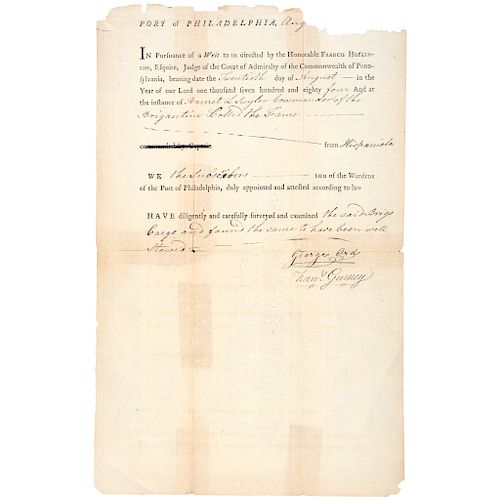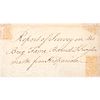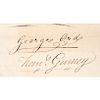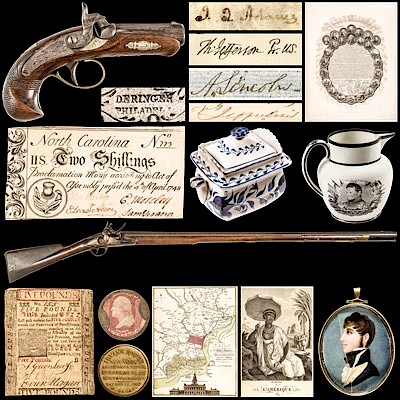FRANCIS GURNEY Whiskey Rebellion Brigadier General
Lot 43
Categories
Estimate:
$375 - $450
Absentee vs Live bid
Two ways to bid:
- Leave a max absentee bid and the platform will bid on your behalf up to your maximum bid during the live auction.
- Bid live during the auction and your bids will be submitted real-time to the auctioneer.
Bid Increments
| Price | Bid Increment |
|---|---|
| $0 | $10 |
| $200 | $20 |
| $300 | $25 |
| $500 | $50 |
| $1,000 | $100 |
| $2,000 | $200 |
| $3,000 | $250 |
| $5,000 | $500 |
| $10,000 | $1,000 |
| $20,000 | $2,000 |
| $30,000 | $2,500 |
| $50,000 | $5,000 |
| $100,000 | $10,000 |
| $200,000 | $20,000 |
| $300,000 | $25,000 |
| $500,000 | $50,000 |
About Auction
By Early American History Auctions
Oct 19, 2019
Set Reminder
2019-10-19 12:00:00
2019-10-19 12:00:00
America/New_York
Bidsquare
Bidsquare : Historic Autographs-Currency-Political-Americana-Militaria-Guns
https://www.bidsquare.com/auctions/early-american-history-auctions/historic-autographs-currency-political-americana-militaria-guns-4513
326 Lots of Rare, Historic Autographs, Americana, Civil War Era, George Washington, Abraham Lincoln, Black History, Revolutionary War Era, Colonial America, Federal Period, War of 1812, Colonial Currency, Indian Peace Medals & more... Early American History Auctions auctions@earlyamerican.com
326 Lots of Rare, Historic Autographs, Americana, Civil War Era, George Washington, Abraham Lincoln, Black History, Revolutionary War Era, Colonial America, Federal Period, War of 1812, Colonial Currency, Indian Peace Medals & more... Early American History Auctions auctions@earlyamerican.com
- Lot Description
Autographs
American French & Indian - Revolutionary War Officer and Whiskey Rebellion Pennsylvania Brigadier General
FRANCIS GURNEY (1738-1815). Philadelphia Businessman, Civic Leader, and Revolutionary War Lieutenant Colonel, served from the French and Indian War to the Whiskey Rebellion, in 1799, promoted to Brigadier General.
August 20, 1784-Dated, Partially-Printed Document Signed, "Fran.(cis) Gurney," as Warden of The Port of Philadelphia, Sealed splits, Fine. This original port document is attesting that cargo on the Brig "Fame of Hispaniola" as been well stowed. It has, 1 page, measures 14" x 9" with some chipping at the top and edges, the upper right corner torn, some archival sealed fold splits on the blank reverse. Well printed on fine quality British Crown watermarked period laid paper. A rarely encountered signature, and on a very scarce printed Naval related document.
Francis Gurney commanded the 11th Pennsylvania Regiment, had also served during the French and Indian War, participating in the Canadian campaign and against the French West Indies Islands, in the capture of Guadeloupe. Gurney was wounded at Iron Hill on September 3, 1777. During the Whiskey Rebellion his military services were called upon, where Gurney led the 600 strong 1st Philadelphia Militia of the against rebelling farmers in Western Pennsylvania.
Francis Gurney (1738-1815), a native of Bucks County, Pa., served in the French and Indian War, and as a colonel with Pennsylvania troops during the Revolution. After the war he became a merchant in Philadelphia and for a time was warden of the post of Philadelphia, a Philadelphia alderman, and a member of the city council (Pennsylvania Magazine of History and Biography, 47 [1923], 175-76).
After the war, Gurney returned to Philadelphia where he began his career as a merchant. During the American Revolution, he donated heavily to the cause both monetarily and in military service. He served as a captain with the Grenadier Company, 3rd Regiment, Philadelphia Militia, and was later promoted to lieutenant colonel. He resigned his commission on October 22, 1777 after a failure to receive an expected promotion. Gurney served throughout the remainder of the war and its aftermath in civilian offices.
In 1794 he was in command of the 1st Regiment of the Philadelphia Brigade with the rank of colonel. Apparently Gurney had considerable difficulty maintaining discipline among his troops, for Washington wrote Hamilton, 26 Oct., on his way back to Philadelphia, that "I heard great complaints of Gurney's Corps (&c some of the Artillery) along the road to Strasburgh. . . . In some places, I was told they did not leave a plate, a spoon, a glass or a knife; and this owing, in a great measure I was informed, to their being left without Officers. At most if not all the encampments, I found the fences in a manner burnt up. I pray you to mention this to Govr. Mifflin" (Library of Congress: Hamilton Papers). In 1799, he was promoted to Brigadier General.
In addition to his other civic and military duties, Gurney served on the Board of Trustees of Dickinson College from 1798 until his death. He was often entrusted with College business in Philadelphia and Washington, D. C. Francis Gurney died on May 25, 1815.
- Shipping Info
-
Early American provides in-house worldwide shipping. Please contact us directly if you have questions about your specific shipping requirements.
-
- Buyer's Premium



 EUR
EUR CAD
CAD AUD
AUD GBP
GBP MXN
MXN HKD
HKD CNY
CNY MYR
MYR SEK
SEK SGD
SGD CHF
CHF THB
THB













